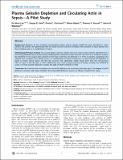| dc.contributor.author | Lee, Po-Shun | |
| dc.contributor.author | Patel, Sanjay R | |
| dc.contributor.author | Christiani, David C. | |
| dc.contributor.author | Bajwa, Ednan Khalid | |
| dc.contributor.author | Stossel, Thomas Peter | |
| dc.contributor.author | Waxman, Aaron Bradley | |
| dc.date.accessioned | 2011-05-19T00:11:11Z | |
| dc.date.issued | 2008 | |
| dc.identifier.citation | Lee, Po-Shun, Sanjay R. Patel, David C. Christiani, Ednan Bajwa, Thomas P. Stossel, and Aaron B. Waxman. 2008. Plasma Gelsolin Depletion and Circulating Actin in Sepsis - A Pilot Study. PLoS ONE 3(11): e3712. | en_US |
| dc.identifier.issn | 1932-6203 | en_US |
| dc.identifier.uri | http://nrs.harvard.edu/urn-3:HUL.InstRepos:4891655 | |
| dc.description.abstract | Background: Depletion of the circulating actin-binding protein, plasma gelsolin (pGSN) has been described in septic patients and animals. We hypothesized that the extent of pGSN reduction correlates with outcomes of septic patients and that circulating actin is a manifestation of sepsis. Methodology/Principal Findings: We assayed pGSN in plasma samples from non-surgical septic patients identified from a pre-existing database which prospectively enrolled patients admitted to adult intensive care units at an academic hospital. We identified 21 non-surgical septic patients for the study. Actinemia was detected in 17 of the 21 patients, suggesting actin released into circulation from injured tissues is a manifestation of sepsis. Furthermore, we documented the depletion of pGSN in human clinical sepsis, and that the survivors had significantly higher pGSN levels than the non-survivors (163±47 mg/L vs. 89±48 mg/L, p = 0.01). pGSN levels were more strongly predictive of 28-day mortality than APACHE III scores. For every quartile reduction in pGSN, the odds of death increased 3.4-fold. Conclusion: We conclude that circulating actin and pGSN deficiency are associated with early sepsis. The degree of pGSN deficiency correlates with sepsis mortality. Reversing pGSN deficiency may be an effective treatment for sepsis. | en_US |
| dc.language.iso | en_US | en_US |
| dc.publisher | Public Library of Science | en_US |
| dc.relation.isversionof | doi:10.1371/journal.pone.0003712 | en_US |
| dc.relation.hasversion | http://www.ncbi.nlm.nih.gov/pmc/articles/PMC2577888/pdf/ | en_US |
| dash.license | LAA | |
| dc.subject | critical care and emergency medicine | en_US |
| dc.subject | immunology | en_US |
| dc.subject | cellular microbiology and pathogenesis | en_US |
| dc.subject | sepsis and multiple organ failure | en_US |
| dc.title | Plasma Gelsolin Depletion and Circulating Actin in Sepsis—A Pilot Study | en_US |
| dc.type | Journal Article | en_US |
| dc.description.version | Version of Record | en_US |
| dc.relation.journal | PLoS ONE | en_US |
| dash.depositing.author | Christiani, David C. | |
| dc.date.available | 2011-05-19T00:11:11Z | |
| dash.affiliation.other | HMS^Medicine-Massachusetts General Hospital | en_US |
| dash.affiliation.other | SPH^Environmental+Occupational Medicine+Epi | en_US |
| dash.affiliation.other | HMS^Medicine-Massachusetts General Hospital | en_US |
| dash.affiliation.other | HMS^Medicine-Brigham and Women's Hospital | en_US |
| dash.affiliation.other | HMS^Medicine-Brigham and Women's Hospital | en_US |
| dc.identifier.doi | 10.1371/journal.pone.0003712 | * |
| dash.contributor.affiliated | Lee, Po-Shun | |
| dash.contributor.affiliated | Stossel, Thomas | |
| dash.contributor.affiliated | Bajwa, Ednan | |
| dash.contributor.affiliated | Patel, Sanjay R. | |
| dash.contributor.affiliated | Waxman, Aaron | |
| dash.contributor.affiliated | Christiani, David | |


